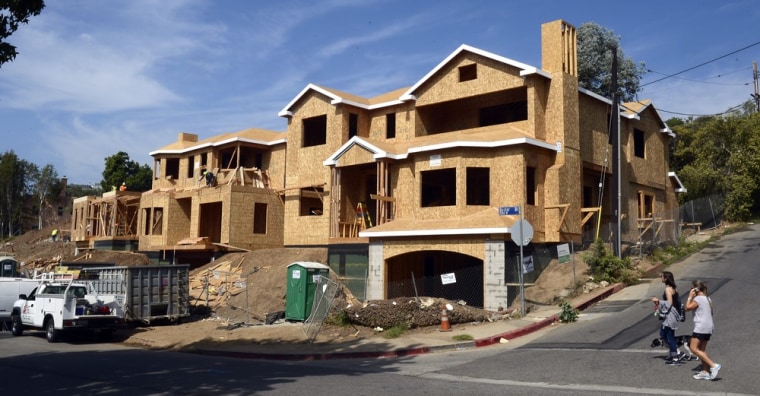The U.S. housing market is on the mend, but the so-called "missing piston" of the world's biggest economy doesn't have enough power to get the broader recovery firing on all cylinders any time soon.
Construction and related activity will help rather than hinder U.S. economic growth this year for the first time since 2005. That was before the housing bust helped push the United States into recession, triggering the global financial crisis.
Higher sales, prices and building, albeit modest so far, are a welcome boost as other drivers of the economy falter.
Nonetheless, housing still accounts for only a small part of gross domestic product compared with the boom years.
The housing sector "would have to be on steroids to significantly boost GDP growth," Paul Dales, an economist with Capital Economics, wrote in a recent research note.
Neither presidential candidate has signaled any new plans to help housing, although the Federal Reserve, aware of the important role of the sector in underpinning the economy, is focusing its latest stimulus efforts in mortgage bonds.
Typically, housing leads the U.S. economy out of recession. But the vast equity losses have stymied the market this time.
Housing's most direct impact on growth is via construction, remodeling and associated services, known as residential investment. Its contribution to GDP has shrunk from a historical average of about 5 percent, and over 6 percent in 2005, to 2.5 percent in the third quarter of this year.
Economists expect residential investment will add two- to three-tenths of a percentage point to GDP in 2013, helping the economy maintain this year's pace of growth.
Americans are likely to spend more on home renovations - probably $134.2 billion in the 12 months to June 2013, up from $115.3 billion at the end of September this year, according to Harvard University's Joint Center for Housing Studies.
That would still be 8 percent off the peak in mid 2007 when borrowing against home values was still soaring.
Now, homeowners remain wary of taking on debt. Most prefer to save for renovations rather than borrow, said Adi Tatarko chief executive of Houzz, a home remodeling online platform.
Jim O'Sullivan, chief U.S. economist at High Frequency Economics says housing-related jobs have grown by an average of 11,000 a month this year. That contrasts with an average monthly decline of 1,000 in 2011 and they should speed up to 30,000 a month by early 2013 as new home construction picks up, he estimates.
Superstorm Sandy, which hammered the U.S. Northeast last week, could put more people to work in construction.
Analysts estimate the U.S. economy needs to create roughly 150,000 jobs a month just to hold the unemployment rate steady.
'Every little bit helps'
The influence of housing reaches further than just construction jobs; it can be a big jolt for consumer spending, which makes up two-thirds of the economy.
Michael Gapen, chief U.S. economist at Barclays Capital, said real estate wealth should begin to boost consumer spending again next year. That would mark an important turning point for households' finances, badly damaged by the housing market collapse and the drop in stock prices during the financial crisis.
"As the consumer goes, so will the broader economy," Gapen said.
The swath of homeowners who owe more on their mortgage than the value of their home is a big factor that has held back the housing recovery. Many "underwater" Americans have been unable to sell their home and buy something more expensive. Such upward mobility in housing has traditionally fueled the market.
More than 20 percent of U.S. mortgages were underwater at the end of June, amounting to 10.8 million homes. Of those, 1.8 million borrowers would recover if prices rose 5 percent, according to data analysis firm CoreLogic.
Price gains like that may not be such a tall order. Economists expect prices to have risen 1.7 percent this year and pick up a further 3.1 percent next year, according to a Reuters poll.
Rising home prices helped 1.3 million homeowners get out from under water in the first half of this year, CoreLogic says.
Those are more homeowners who could potentially refinance their mortgages, putting more spending money in their pockets.
A number of factors suggest the recovery will be slow and modest, like that of the broader economy. These factors include a backlog of pending foreclosures, the large amount of distressed homes up for sale, often at low prices, and the difficulty in getting a mortgage.
In the meantime, the Fed will buy $40 billion in mortgage-related debt each month as it tries to bolster the housing sector which Fed Chairman Ben Bernanke has called the "missing piston" of the U.S. economic recovery.
"Every little bit helps," Scott Brown, chief economist at Raymond James, said of housing.
"People always ask, 'What's going to drive the recovery?' It's never usually one particular thing, but a lot of little things getting better at the same time."
